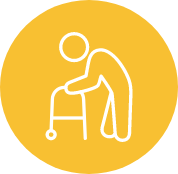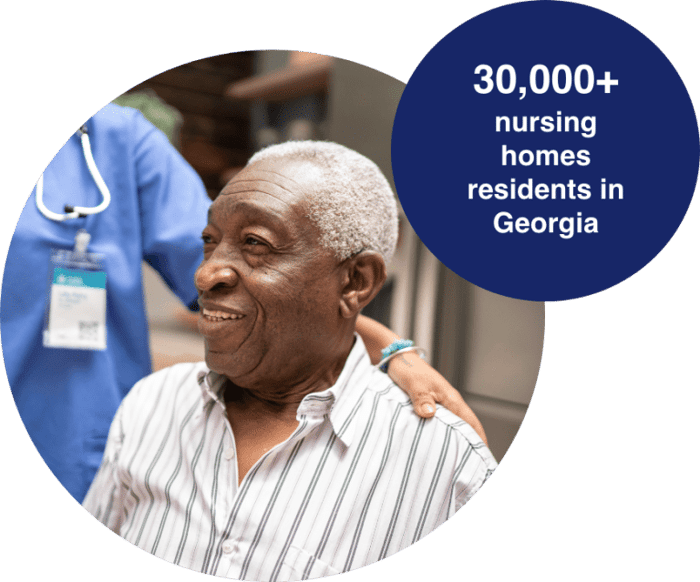Was your loved one a victim of nursing home abuse or negligence in Georgia?
Finding an experienced lawyer with the right background is crucial in these types of cases. Let our law firm secure compensation and justice for your family, and stop those responsible from harming others.
Deciding to put a loved one in a long-term assisted care facility is difficult enough, and then you have to choose which facility is right. Not all seniors require long-term care. But for those who do, there is a spectrum of options ranging from independent living and assisted care facilities, to in-home nurses and memory care, to hospice and nursing homes.
As of 2020, there were somewhere between 30,000 to 35,000 nursing home residents in Georgia, according to the Kaiser Family Foundation. There are more than 350 nursing homes and over 1,300 senior living providers.
Unfortunately, many facilities in Georgia have a track record of abuse and neglect.
Several in-depth, investigative reports—including by the Atlanta-Journal Constitution and ProPublica—found that a surprisingly large number of long-term care facilities in Georgia were found to have serious deficiencies, rampant reports of abuse and negligence, and were forced to pay millions in penalties.
In fact, roughly 10 percent of Georgia nursing homes were found to have serious deficiencies. What’s more, there are over 5 million elder abuse cases each year nationwide, and 1 in 10 people over the age of 60 report having been abused.
What’s more, in 2019, Families for Better Care gave Georgia a failing “F” grade for the second straight report card as the state’s overall ranking sank from No. 43 to No. 48. This was because the percentage of Georgia nursing homes investigated for severe deficiencies nearly doubled in recent years, complaints swelled nearly 5 percent, and chronic understaffing continues to be a problem—making these facilities rife for negligence and abuse.
According to ProPublica, of the facilities nationwide that paid the highest fines and had the most serious deficiencies, several are located in
Georgia—including:
● Pioneer Health of Central Georgia (Byromville, GA)
● Fountain Blue Rehab and Nursing (Macon, GA)
● East Lake Arbor (Decatur, GA)
● Crossview Care Center (Pineview, GA)
● Pinewood Nursing Center (Whigham, GA)
Wherever your loved one is being cared for, they deserve the best. At the very least, they deserve to live out their remaining life in peace and safety. By reporting abuse and pursuing legal justice, you can not only help protect your loved one but also make sure that those responsible are held accountable and will never be able to hurt another family or resident again.
If you believe abusive treatment is occurring now or has in the past to your loved one in the past, don't hesitate to consult with a knowledgeable Georgia nursing home abuse attorney immediately to learn about your legal rights.
Types and signs of nursing home abuse
One of the most difficult things about preventing nursing home abuse is properly identifying when it is happening. Differentiating between natural aging conditions and abuse isn’t always clear-cut. Sometimes, certain health conditions such as dementia and Alzheimers can cause a resident to act unusually, lose interest in their hobbies and passions, or lose weight suddenly due to a loss of appetite — all possible signs of abuse, as well. Or perhaps a resident loses their balance and injures more easily, resulting in bruises and broken bones that might be mistaken for signs of physical abuse.
For this reason, it’s important to be vigilant when visiting your loved one to spot signs that they may be experiencing a form of abuse. It’s also a good idea to visit at different times and come unannounced in order to get a better understanding of your loved one’s living conditions.
According to Georgia’s Department of Human Services: Abuse of older and disabled adults (at-risk adults) is one of the most undetected and underreported problems in the U.S.
So if you witness 1 or more of the following signs of abuse, consider reporting the incident to authorities and contacting a nursing home abuse lawyer as soon as possible if you believe your loved one is being abused or neglected.
Physical abuse
Physical abuse is any intentional act of violence that involves physical injury or trauma to a nursing home resident. Such abuse may occur at the hands of nursing home employees or other residents. Hitting, biting, pushing, shoving and grabbing are examples of physical abuse, as is forcefully restraining or confining a resident for long periods of time.
Signs of physical abuse:
● Bruises
● Broken bones
● Cuts and abrasions
● Head injuries
● Unexplained wounds
● Fear of being touched
Emotional abuse
If a person's words or actions cause a resident fear, stress, anxiety or mental distress, then this may constitute emotional abuse. Emotional, verbal and psychological abuse is particularly difficult to spot since the signs may be more subtle and not visible to the eye like physical abuse. However, this type of nursing home abuse can often be identified by noticing changed behavior in the resident. Name-calling, threats, insults and isolation are all examples of this emotional or psychological abuse. Emotional, verbal and psychological abuse is particularly difficult to spot since the signs may be more subtle and not visible to the eye like physical abuse. However, this type of nursing home abuse can often be identified by noticing changed behavior in the resident. Name-calling, threats, insults and isolation are all examples of this emotional or psychological abuse.
Signs of emotional abuse:
● Depression
● Anxiety
● Withdrawn behavior
● Increased agitation
● Non-communicative
(especially in front of
staff members)
● Sudden rocking and other
compulsive behaviors
● Heavy medication/
sedation
Sexual abuse
Nursing home staff and administrators hold a position of power over residents—some of whom may be incapable of providing consent. As a result, nursing home residents are particularly vulnerable to sexual abuse including non-consensual intercourse, oral sex, groping, touching or exposure. Nursing home residents who experience unsolicited and unwanted sexual activity may show signs of physical, emotional and psychological trauma.
Signs of sexual abuse:
● Sexually transmitted infections (STIs)
● Pelvic bleeding or pain
● Unexplained pain or injuries in the genital area
● Emotional and social withdrawal
● Repeated urinary tract infections
● Difficulty sitting or walking
Neglect
Though different from other types of abuse where a resident is deliberately and maliciously harmed by another person’s actions, negligence is an intentional or unintentional failure to provide basic preventative care and appropriate treatment to nursing home residents. A resident may be neglected by the facility staff and caregivers, or by medical staff and doctors (malpractice).
Signs of neglect:
● Malnutrition
● Dehydration
● Bedsores
● Unclean living quarters
● Dirty bedding and linens
● Poor hygiene
● Secondary infections
Financial abuse
Unfortunately, there are people out there who seek to exploit the vulnerability of nursing home residents for financial gain. Sometimes, facility staff members or administrators will seek to get financial control of a resident in order to commit fraud and abuse. Examples of financial exploitation include not allowing residents to access their own funds, forging bank documents, billing for services not provided, stealing their money or possessions, and manipulating a resident into giving up control of their money.
Signs of financial abuse:
● Missing possessions and
belongings
● Unexplained bills, loans
or bank withdrawals
● Forged checks
● Identity theft
● Sudden changes in will
recipients or spending
patterns
● Resident not willing to
discuss financial
matters

Nursing home abuse comes in all shapes and sizes
Often, multiple types of nursing home abuse occur at the same time. For example, a resident who is being sexually abused may also show signs of physical and emotional abuse.
If your loved one is showing any sign of possible abuse or neglect, take steps to ensure their safety, report the facility and consult with a nursing home abuse attorney to investigate.
Georgia’s nursing home residents’ bill of rights
In Georgia, residents of nursing homes and long-term care facilities have legally protected rights. These rights are clearly laid out by the Department of Community Health in § 31-8-5. While the full statute is quite extensive and we won’t cover it all here, below we’ve listed a few of the basic rights that all nursing home residents in Georgia enjoy:
- ● Right to transparent billing and access to non-medical records kept by the facility
- ● Right to “adequate and appropriate” care, treatment and services
- ● Right to personal dignity and privacy
- ● Right to choose a physician and plan medical care
- ● Right to be free from actual or threatened physical restraints, isolation, or restrictions on mobility (including use of drugs to limit mobility
- ● Right to rise and retire when desired
- ● Right to enter and leave the facility at will
- ● Right to refuse visitation
- ● Right to manage personal financial affairs
- ● Right to voice complaints and
It’s also important to note that a resident’s representatives have a right to see the resident and their living quarters during normal visitation hours, unless the resident refuses the visit.
Who’s liable for nursing home abuse?
Anyone who commits nursing home abuse or negligence can be held liable under Georgia law. Understanding the potential abusers commonly found in nursing homes can help you identify and stop abuse from occurring, as well as know who to sue if your loved one is harmed physically, emotionally and financially.
Nursing home staff
and caregivers
The most common culprits of nursing home abuse and negligence are the staff, aides, volunteers and caregivers working at the facility. These individuals have direct contact with the residents, and they are responsible for each resident’s health, care and safety.
Nursing home
administrators
Administrative staff typically don’t handle the day-to-day care of nursing home residents; however, they are responsible for managing the resident’s finances and accounts, which makes them perfectly positioned to commit financial abuse and fraud.
Treating doctors
and nurses
While in the care of a nursing home, residents often have ongoing medical care and treatment needs. The resident may require transportation to and from doctor appointments. In the course of this care, the medical provider may fail to diagnose a condition or fraudulently bill for services not provided, thus committing financial abuse or medical negligence.
Other residents
If not properly cared for and supervised by nursing home staff, one resident may inflict physical, emotional or sexual abuse on another resident. While there are limits on holding a nursing home resident personally liable for abuse — particularly if they suffer from a mental or cognitive illness — the nursing home staff and facility may be liable for failing to protect a resident from harm.
Visitors
While most instances of nursing home abuse are committed by non-relatives, sometimes a visiting family member or friend may physically or emotionally abuse, or financially exploit, a resident who is in the care of a long-term care facility. Residents have a right to refuse visitation. If this request is denied and the resident is harmed by a visitor, the nursing home staff and facility may be liable.
Nursing home facility
If harm comes to a resident, then the facility itself (or the company that is responsible for managing the nursing home) may be liable. Nursing homes have a legal duty to provide all residents an environment that is free of abuse, harm and neglect — whether caused by the staff, outside visitors or other residents. Failing to fulfill this duty may be cause to hold the facility accountable.
Compensation in nursing home abuse lawsuit
When a victim of nursing home or elder suffers abuse, Georgia law allows the individual or their close family members to seek compensation for “damages.” Economic damages may include medical expenses (if treatment/therapy is needed for physical or emotional injuries) and lost wages (if the resident of a long-term care facility is not yet retired and was prevented from returning the work).
In nursing home abuse cases, non-economic damages tend to be the most commonly awarded type of compensation. These damages aim to compensate victims for pain and suffering, emotional distress, mental anguish, reduced quality of life and other non-economic losses caused by the defendant.
What’s more, plaintiffs in nursing home abuse or neglect cases may also be able to seek punitive damages, which are intended to punish the defendant for grossly negligent acts or malicious behavior that was intentional and especially egregious.
Meet your Georgia nursing home injury attorney
Julian Lewis Sanders founded The Law Offices of Julian Lewis Sanders and Associates in 2003. The firm proudly serves Georgia and the surrounding communities of Georgia in personal injury law.
“Growing up in a military family, I learned the importance of dedication and honor early, which established a foundation for my eventual
law career.”
Excellent! Some time ago, my wife found out about Julian Sanders, and she hired their services as our legal representatives in court. They helped us in getting the compensation due to us. I can never thank them enough. – Jastin Clark
We want to help you. Give us a chance to listen to your needs, answer your questions, and show you how we will take swift strategic action to help right the wrong that has been done to you.
Call or text the Law Offices of Julian Sanders & Associates 24 hours a day, 7 days a week:
(678) 705-9581
NURSING HOME NEGLECT
If you suspect that your loved one was abused or neglected at a nursing home or long-term care facility, the first thing you should do is report the abuse to the proper authorities. If it’s an emergency, call 9-1-1. Otherwise, in Georgia, you can contact the Department of Human Services Division of Aging Services by phone or via their online reporting form.
Next, consult with an experienced and knowledgeable attorney at The Law Offices of Julian Lewis Sanders and Associates. We will gather evidence, investigate the facility, obtain medical records and consult with medical experts to determine the best course of action and explore your legal rights. What’s more, we’ll review all the facts to properly calculate the value of your case.
Most nursing homes and long-term care facilities are run by massive healthcare corporations with deep pockets and teams packed with experienced defense lawyers. In order to go up against these corporate giants, it’s vital you hire a legal expert of your own to even the playing field and seek justice on the behalf of your loved one.


